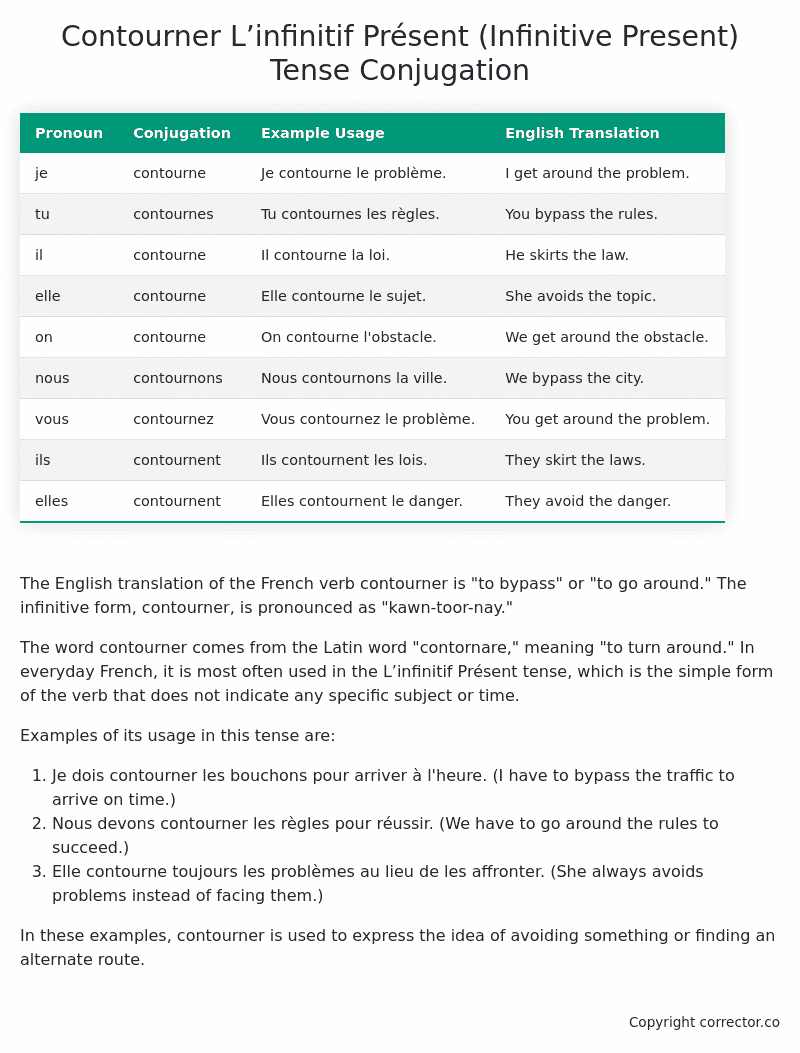L’infinitif Présent (Infinitive Present) Tense Conjugation of the French Verb contourner
Introduction to the verb contourner
The English translation of the French verb contourner is “to bypass” or “to go around.” The infinitive form, contourner, is pronounced as “kawn-toor-nay.”
The word contourner comes from the Latin word “contornare,” meaning “to turn around.” In everyday French, it is most often used in the L’infinitif Présent tense, which is the simple form of the verb that does not indicate any specific subject or time.
Examples of its usage in this tense are:
- Je dois contourner les bouchons pour arriver à l’heure. (I have to bypass the traffic to arrive on time.)
- Nous devons contourner les règles pour réussir. (We have to go around the rules to succeed.)
- Elle contourne toujours les problèmes au lieu de les affronter. (She always avoids problems instead of facing them.)
In these examples, contourner is used to express the idea of avoiding something or finding an alternate route.
Table of the L’infinitif Présent (Infinitive Present) Tense Conjugation of contourner
| Pronoun | Conjugation | Example Usage | English Translation |
|---|---|---|---|
| je | contourne | Je contourne le problème. | I get around the problem. |
| tu | contournes | Tu contournes les règles. | You bypass the rules. |
| il | contourne | Il contourne la loi. | He skirts the law. |
| elle | contourne | Elle contourne le sujet. | She avoids the topic. |
| on | contourne | On contourne l’obstacle. | We get around the obstacle. |
| nous | contournons | Nous contournons la ville. | We bypass the city. |
| vous | contournez | Vous contournez le problème. | You get around the problem. |
| ils | contournent | Ils contournent les lois. | They skirt the laws. |
| elles | contournent | Elles contournent le danger. | They avoid the danger. |
Other Conjugations for Contourner.
Le Present (Present Tense) Conjugation of the French Verb contourner
Imparfait (Imperfect) Tense Conjugation of the French Verb contourner
Passé Simple (Simple Past) Tense Conjugation of the French Verb contourner
Passé Composé (Present Perfect) Tense Conjugation of the French Verb contourner
Futur Simple (Simple Future) Tense Conjugation of the French Verb contourner
Futur Proche (Near Future) Tense Conjugation of the French Verb contourner
Plus-que-parfait (Pluperfect) Tense Conjugation of the French Verb contourner
Passé Antérieur (Past Anterior) Tense Conjugation of the French Verb contourner
Futur Antérieur (Future Anterior) Tense Conjugation of the French Verb contourner
Subjonctif Présent (Subjunctive Present) Tense Conjugation of the French Verb contourner
Subjonctif Passé (Subjunctive Past) Tense Conjugation of the French Verb contourner
Subjonctif Imparfait (Subjunctive Imperfect) Tense Conjugation of the French Verb contourner
Subjonctif Plus-que-parfait (Subjunctive Pluperfect) Tense Conjugation of the French Verb contourner
Conditionnel Présent (Conditional Present) Tense Conjugation of the French Verb contourner
Conditionnel Passé (Conditional Past) Tense Conjugation of the French Verb contourner
L’impératif Présent (Imperative Present) Tense Conjugation of the French Verb contourner
L’infinitif Présent (Infinitive Present) Tense Conjugation of the French Verb contourner (this article)
Struggling with French verbs or the language in general? Why not use our free French Grammar Checker – no registration required!
Get a FREE Download Study Sheet of this Conjugation 🔥
Simply right click the image below, click “save image” and get your free reference for the contourner L’infinitif Présent tense conjugation!

Contourner – About the French L’infinitif Présent (Infinitive Present) Tense
Forming the Infinitive Present
Common Everyday Usage Patterns
As a Verb’s Dictionary Form
After Modal Verbs
As an Imperative
In Infinitive Clauses
Interactions with Other Tenses
Present Tense
Future Tense
Conditional Tense
Passé Composé
Imperfect Tense
Subjunctive and Conditional Moods
Summary
Want More?
I hope you enjoyed this article on the verb contourner. Still in a learning mood? Check out another TOTALLY random French verb conjugation!


